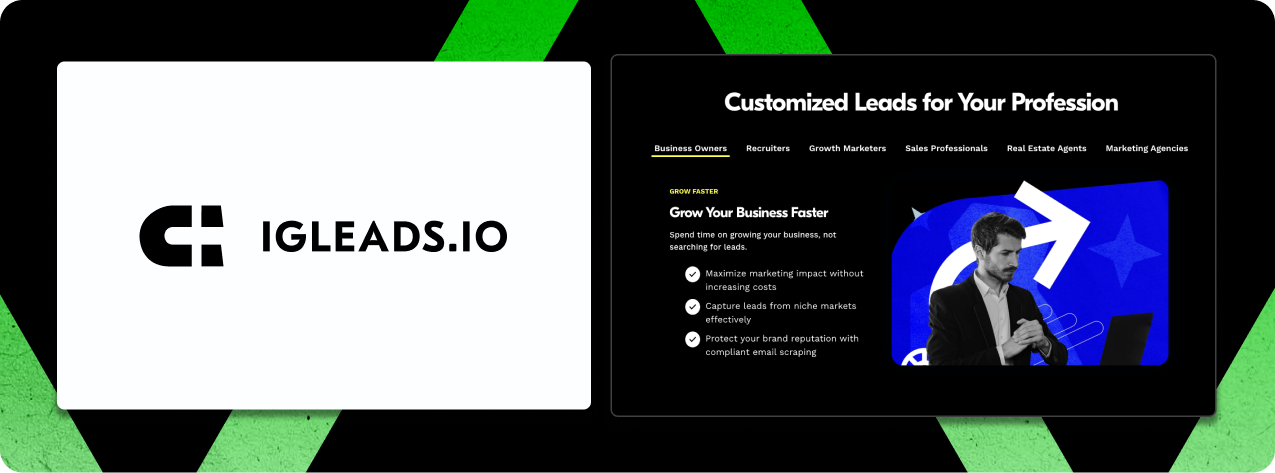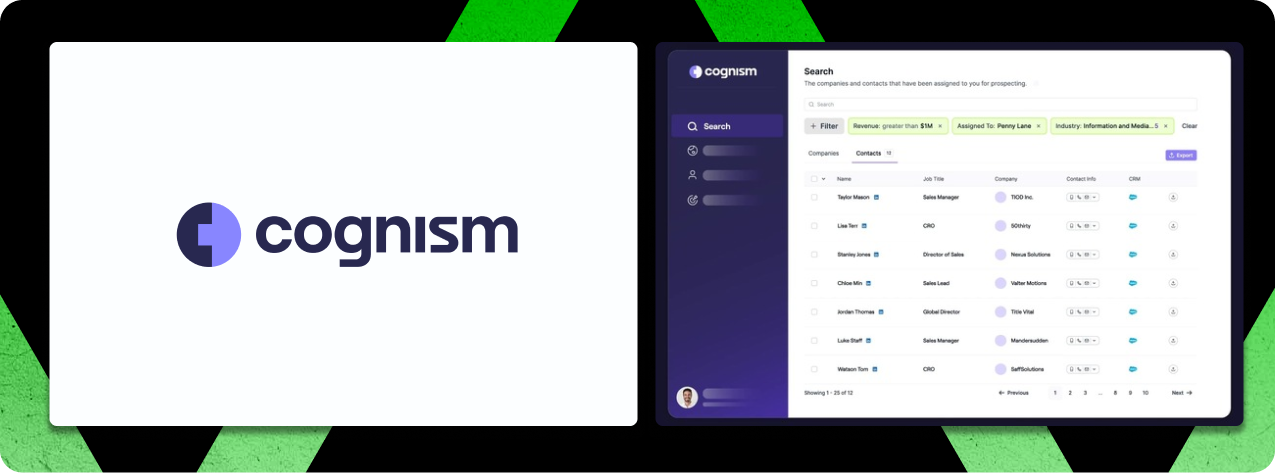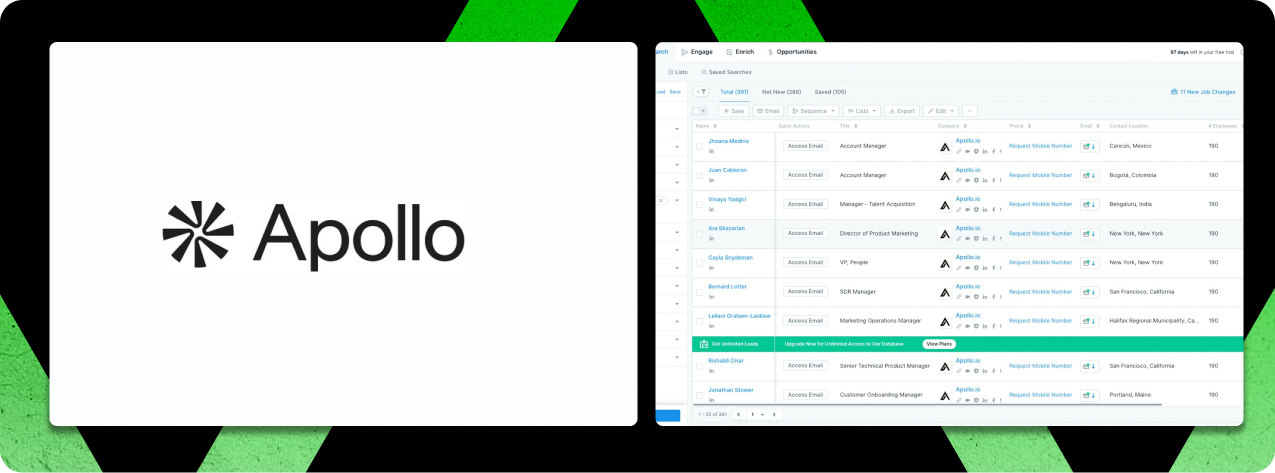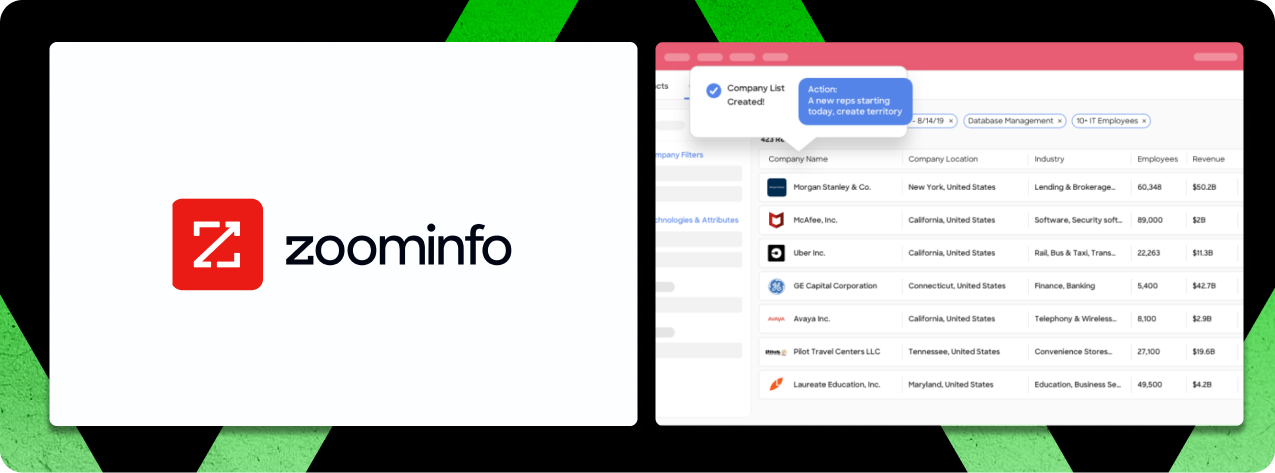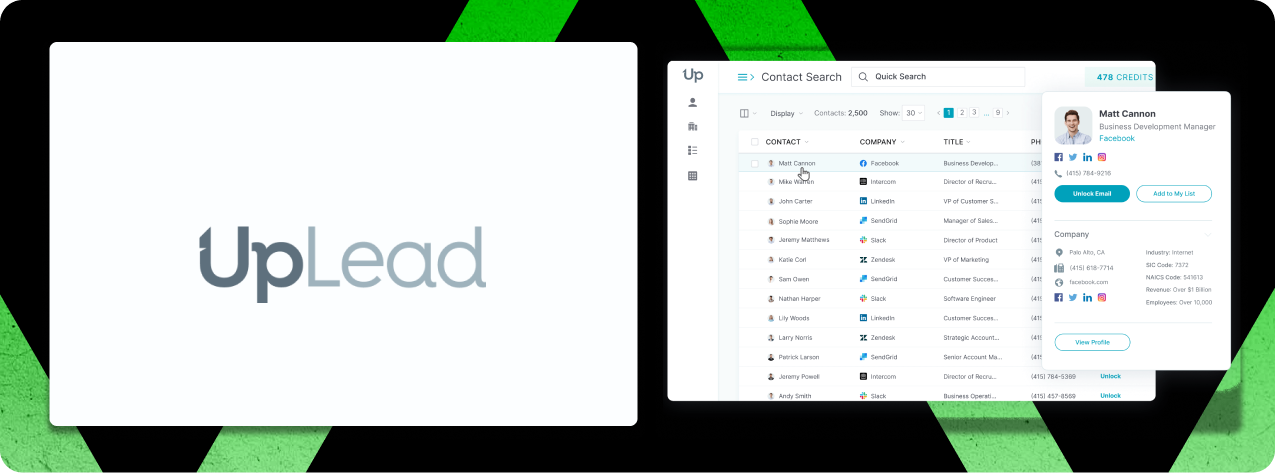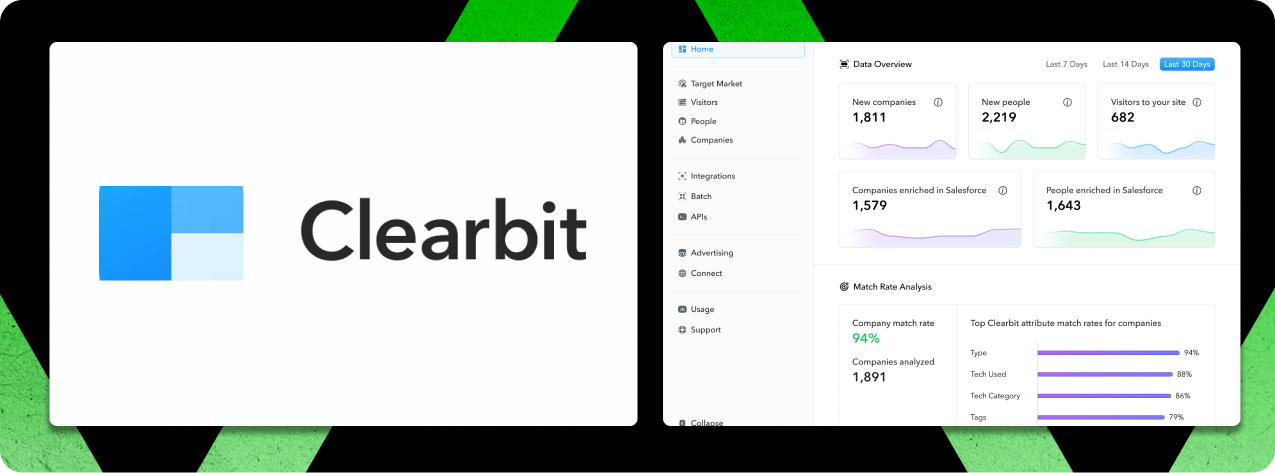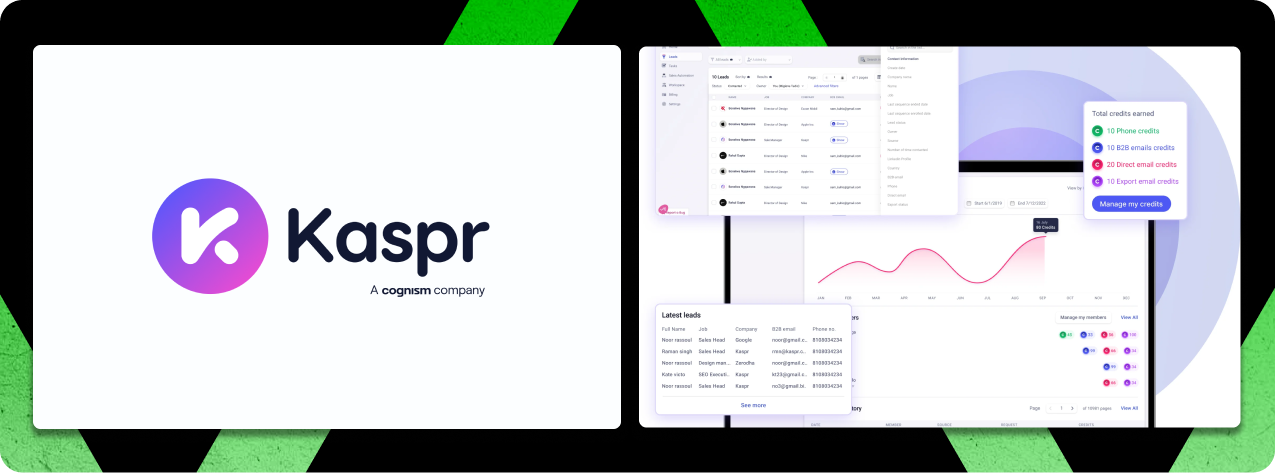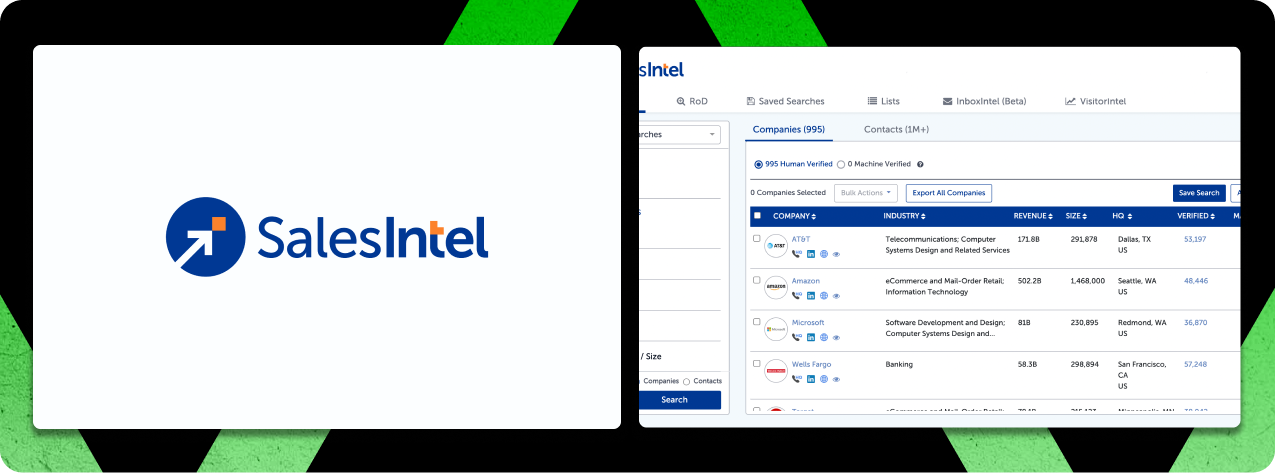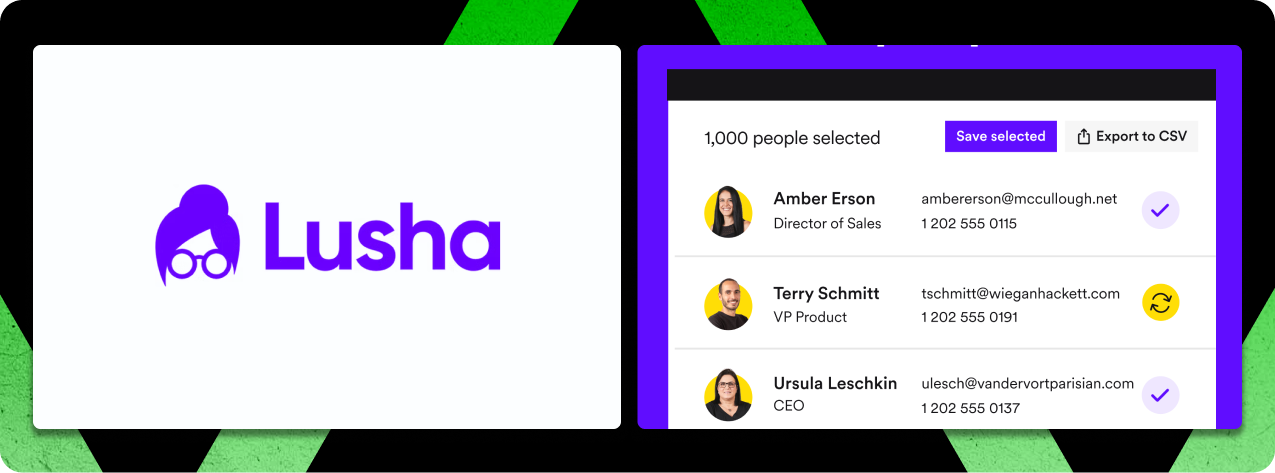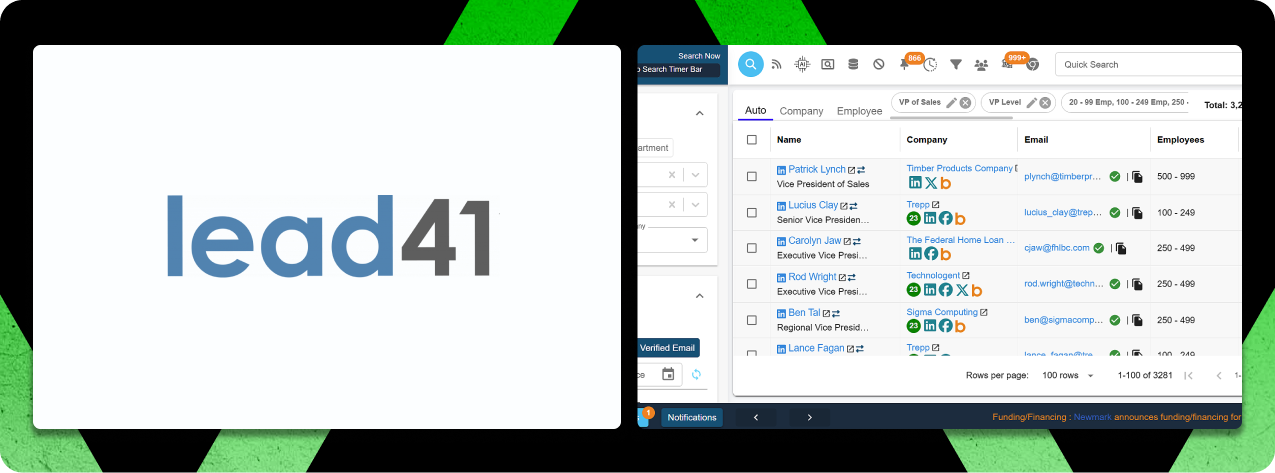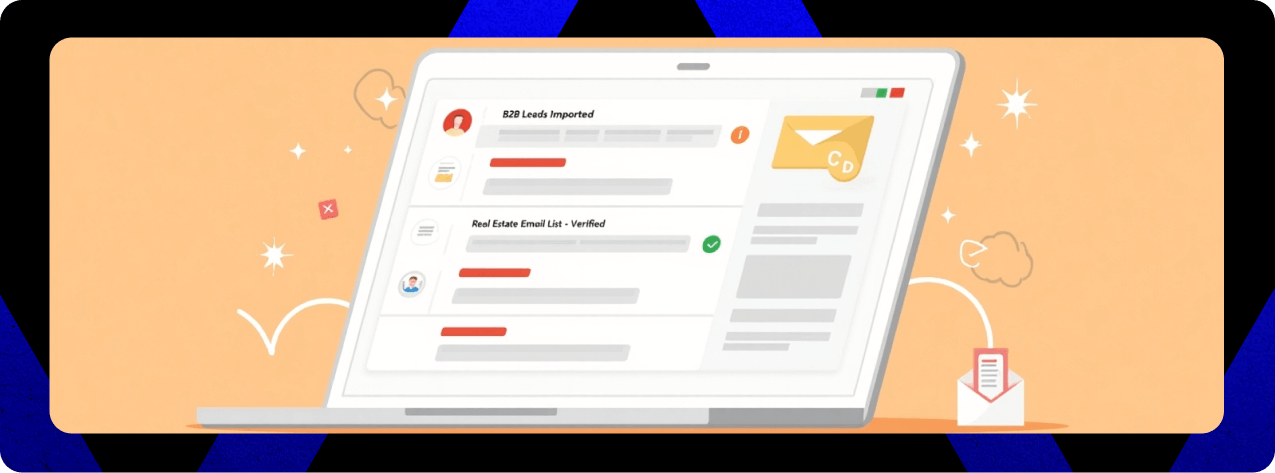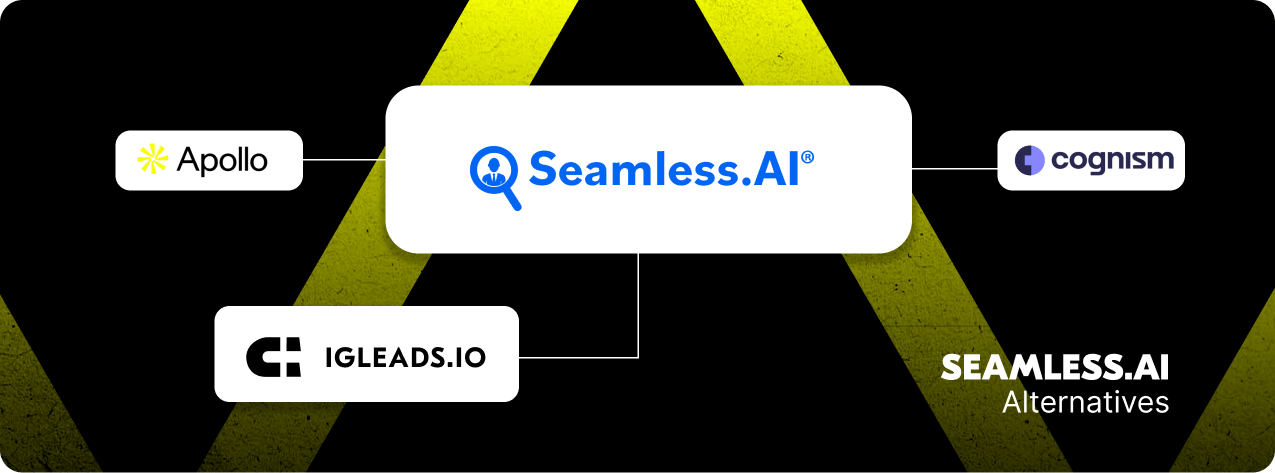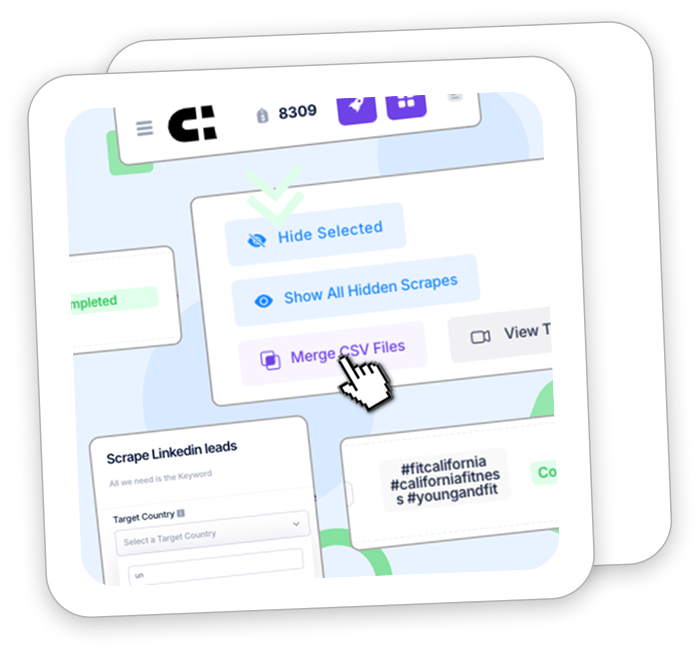Best B2B email list providers in 2025
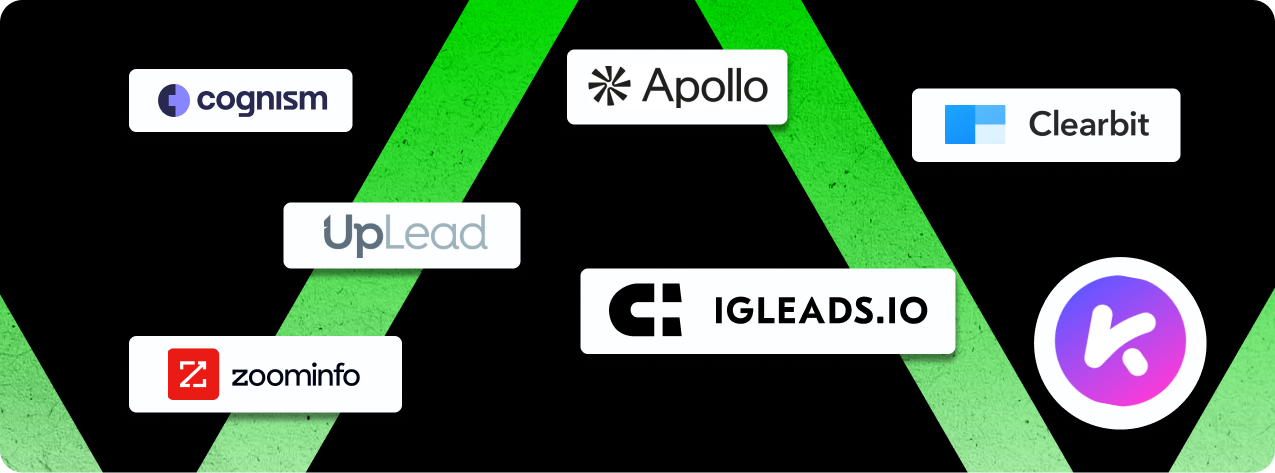
In 2025, email outreach remains one of the highest ROI channels in B2B marketing, with studies showing that for every $1 spent, businesses can expect an average return of $42 according to ProfitOutreach. Yet despite its effectiveness, many companies struggle with the first critical step: acquiring high-quality, accurate B2B email leads. Common challenges include outdated databases, lack of verified contact info, difficulty targeting niche audiences, and high costs from traditional data providers.
This guide is designed to help you navigate the crowded landscape of B2B email list providers by comparing top tools available today, like email scrapers, and showing you how to build your own targeted email lists using modern, cost-efficient methods.
10 top B2B email list providers in 2025
Finding accurate and verified email contacts is essential for sales, marketing, and outreach campaigns. IGLeads brings you the 10 top tools in the email list provider space in 2025, each offering unique strengths depending on your business size, industry, and data needs. You will notice that prices vary a lot in this industry, so make sure you choose the best tool and use your resources wisely!
1. IGLeads.io
IGLeads is our lightweight, cost-effective web scraping solution. This platform allows users to build targeted email lists from social media platforms (like Instagram, TikTok, LinkedIn) and local business directories such as Google Maps or Realtor.com.
It is perfect for solo entrepreneurs, real estate agents, marketers, and small teams looking for niche or hyper-local leads without expensive subscriptions. Overall, IGLeads is a cost-effective web scraping platform that allows you to get a fresh database for email marketing using legal practices.
Pros:
- Affordable pricing suitable for small businesses and entrepreneurs.
- User-friendly interface with quick setup.
- Effective for niche or hyper-local lead generation.
Cons:
- Data accuracy depends on the source; may require manual verification.
Pricing: Plans start at only $59/month.
2. Cognism
Cognism is a premium B2B lead generation platform offering GDPR-compliant contact data, including verified emails and direct dials. It’s known for its global data coverage and AI-powered prospecting features. It is suitable for enterprise sales teams and companies prioritizing compliance and high-volume outreach.
Pros:
- High-quality, compliant data with global coverage.
- AI-driven tools for efficient prospecting.
- Integration with major CRMs.
Cons:
- Pricing is not transparent, it requires contacting sales for quotes.
- May be cost-prohibitive for small businesses.
Pricing: Customized pricing based on business needs; includes a platform fee and flexible workflows.
3. Apollo.io
Apollo is a powerful sales engagement and email database tool that combines lead generation with automated email sequencing and CRM features. It is used mostly by B2B sales teams and SDRs looking for an all-in-one outreach and list-building platform with automation.
Pros:
- All-in-one platform with CRM integration.
- Advanced filtering and automation capabilities.
Cons:
- Some users report inconsistent pricing and sales practices.
- Learning curve for new users.
Pricing: it offers a free plan with limited features, and then the basic, professional and organization plans with prices ranged from $59 to $149
4. ZoomInfo
ZoomInfo is an industry-leading data intelligence platform offering extensive business data, technographics, and intent data. Its database is vast and trusted by many Fortune 500 companies. It works perfectly for large-scale sales operations needing deeply enriched data and integrations with major CRMs.
Pros:
- Comprehensive and up-to-date database.
- Advanced features like intent data and technographics.
- Strong integration with various sales tools.
Cons:
- High cost with potential hidden fees, it is one of the most expensive tools in the market.
- Long-term contracts required.
Pricing: Plans start at $15,000/year, with higher tiers like Advanced and Elite ranging up to $30,000/year.
5. UpLead
UpLead is a B2B contact database tool with real-time email verification. It allows users to search by company, contact title, industry, and more, ensuring accuracy before download. It is focused on small and medium sized businesses, and teams that need reliable email lists with high deliverability rates.
Pros:
- High data accuracy with real-time verification.
- User-friendly interface.
Cons:
- Limited free trial with only 5 credits.
- Some advanced features require higher-tier plans.
Pricing: $74/month with the essential plan, and then there is an upgrade to the Plus plan for $149/month and the professional plan with custom pricing.
6. Clearbit
Clearbit is a data enrichment tool used to add firmographic and contact data to CRM systems. It’s widely used in SaaS and tech for personalizing marketing and sales efforts. It is especially useful for growth and marketing teams using HubSpot or Salesforce that need lead enrichment rather than list downloads.
Pros:
- Real-time data enrichment.
- Seamless integration with platforms like HubSpot and Salesforce.
Useful for personalized marketing efforts.
Cons:
- Pricing is opaque and can be unstable, especially post-acquisition.
- May be expensive for small businesses.
Pricing: Starts at $99/month for 275 API requests; higher tiers can exceed $20,000/year.
7. Kaspr
Kaspr is a LinkedIn-focused email and phone number finder with Chrome extension capabilities. It pulls contact data in real time and is popular among recruiters and B2B marketers. Therefore, it is mostly used for LinkedIn prospecting and it will give you quick access to verified emails via browser extensions.
Pros:
- Easy-to-use Chrome extension.
- Real-time data retrieval from LinkedIn.
- Affordable entry-level pricing.
Cons:
- Limited features on the free plan.
- Data accuracy may vary.
Pricing: the free plan includes 15 B2B email credits/month, and the paid plan costs $49/month.
8. SalesIntel
SalesIntel provides human-verified B2B contact and company data, offering features like buyer intent signals, technographics, and enrichment tools. Its main target is in the US, and it is useful for sales teams that require verified data and are looking to combine contact discovery with intent data.
Pros:
- High data accuracy with human verification.
- Comprehensive data including intent signals.
- Strong customer support.
Cons:
- Higher cost compared to some competitors.
- May be more suitable for larger sales teams.
Pricing: Median contract value is approximately $19,000/year.
9. Lusha
Lusha is a popular email and phone number finder with CRM integration and a strong presence on LinkedIn. It’s fast, user-friendly, and designed for sales teams. B2B sales reps who need quick, reliable contact data during outbound prospecting are the target users of Lusha.
Pros:
- User-friendly interface.
- Affordable pricing for small teams.
- Integration with major CRMs.
Cons:
- Limited features on lower-tier plans.
- Credit-based system may not suit all users.
Pricing: the pro plan is billed annually with a price of $29/month, and the premium plan goes up to $59/month
10. Lead411
Lead411 is a sales intelligence platform offering verified emails, mobile numbers, and intent data. It’s known for its affordability and U.S.-based contact accuracy. It is focused on medium and small sized businesses.
Pros:
- Unlimited data access on certain plans.
- High accuracy with verified contacts.
Cons:
- Primarily focused on the U.S. market.
- Some features may require higher-tier plans.
Pricing: Plans start at $99/month.
So, if we are looking for economic options for a small or medium sized business, or even if you are an entrepreneur or sales agent that has limited resources, these are our shortlisted ones: IGLeads, Apollo.io, Kaspr and Lusha.
They all offer monthly plans for less than $60, which is perfect for growth and ROI strategies. However, IGLeads is better for social media marketers, realtors and local businesses, while Apollo.io, Kaspr and Lusha are focused mostly on traditional B2B sales teams. IGLeads also helps you to find micro-influencers, real estat leads, content creators… with flexible pricing (monthly subscription) and no contracts. If you are new in marketing and sales, you should try this tool to keep your business growing.
How to build your own B2B email list provider (step-by-step)
You have probably tried all the email list building alternatives, and maybe you got to the conclusion that building your own B2B email list provider isn’t just a cost-effective way to scale outreach: it’s also a powerful business model if done right. Whether you’re generating leads for your company or reselling data to others, having control over how your list is built can give you a serious edge in quality, targeting, and compliance.
This guide breaks down how to start building B2B email lists yourself, whereas it is manually, with tools, and smart tactics for verification. Also, we want to help you decide when to build instead of buying.
1. Manual methods: starting with public data
If you’re bootstrapping or want hyper-targeted leads, manual sourcing is a great place to start. Here are the top three platforms to explore:
1. LinkedIn
LinkedIn is a goldmine for B2B data. You can search by job title, industry, company size, and location using LinkedIn’s native filters. While emails aren’t listed directly, you can use tools like Hunter or Lusha to retrieve associated addresses based on company domains.
Pro tip: Use LinkedIn Sales Navigator for deeper filters and build lead lists directly from saved searches.
2. Company websites
Many small to mid-sized companies list decision-makers in their “About” or “Team” pages. Scraping this manually or with browser extensions can help uncover names, roles, and sometimes direct emails.
Look for: Contact pages, press releases, blog author bios, or downloadable whitepapers where contact info might be listed.
3. Google Maps
If you’re going after local businesses—say dentists in Dallas or gyms in Chicago—Google Maps is perfect. Each listing includes company names, websites, phone numbers, and sometimes emails.
Steps: Search a niche + location → Open listings → Grab website → Scan for contact info.
Manual collection is slow, but it’s ideal when you need ultra-specific, verified, or local data.
2. Using scraping tools: scale fast with automation
Once you’ve validated a process manually, the next step is to automate it. Scraping tools allow you to pull bulk data from online sources quickly.
- IGLeads.io: extracts leads from Instagram, LinkedIn, TikTok, Google Maps, and Realtor.com. Great for niche targeting (e.g. realtors, influencers).
- Phantombuster: offers pre-built LinkedIn, Instagram, and Google Maps scrapers.
- Scrapy (Python): for developers, this open-source framework lets you scrape anything from websites to forums at scale.
- Octoparse / ParseHub: drag-and-drop web scraping tools, no coding required.
How to get the best of these tools? Remember to target one source at a time (e.g., just LinkedIn or just Maps) to reduce complexity; respect scraping laws and terms of service (especially in the EU or for platforms like LinkedIn) and use proxies or throttling to avoid IP bans when scraping at scale. Once scraped, your raw list will likely include names, websites, roles, and business types—but you’ll need to find or verify their email addresses.
If you are ready to start scrapping, sign up to IGLeads and start today!
3. Cleaning & verifying email addresses
Clean data brings higher deliverability and fewer bounced emails. You can use email guessing & verification tools:
- Hunter.io – Finds and verifies emails using domain + name.
- NeverBounce / ZeroBounce – Clean your list by removing invalid or risky addresses.
- VoilaNorbert / Snov.io – Help discover and validate email addresses at scale.
And keep in mind the best practices in the industry: stick to company domains (e.g., jane@company.com) over generic Gmail or Yahoo emails, verify before sending (bounce rates over 3-5% can tank your sender score) and regularly update lists (people change jobs, and data decays fast in B2B).
When to DIY vs when to buy your B2B email list
Well… this is the question, my friend: should you build your own B2B email list, or buy one from a provider?
Building your own B2B email list provider is a great idea if you want niche targeting (e.g., vegan restaurant owners in Austin), you’re starting small and want to control costs, you’re creating a service offering email lists to others and you’re concerned with data freshness and accuracy.
DIY gives you full control over the source, structure, and frequency of updates. It’s also more compliant if done right.
You should buy a B2B email list provider if you need to scale quickly for a campaign or event, your targeting is broad (e.g., HR managers in the U.S.) and you prefer verified, ready-to-use data over time-consuming scraping.
Top providers like Apollo.io, UpLead, and SalesIntel offer enriched, compliant lists with email verification built in—but they can cost $1,000–$20,000+ per year depending on volume and features.
If you’re willing to put in the effort, building your own B2B email list can save money, offer better targeting, and create new income streams, especially if you package and resell the data to others in your niche. In conclusion: start manual, scale with tools, always verify, and use a hybrid approach based on your budget and goals.
What makes a good B2B email list provider?
Not all B2B email list providers are created equal. Whether you’re running outbound sales campaigns or nurturing leads through email sequences, the quality of your email list can make or break your results. A good email list generator doesn’t just offer contacts, it offers verified, relevant, and compliant data that integrates seamlessly into your sales stack.
Here are the five key traits that separate top-tier providers from the rest:
- Accuracy is everything in B2B outreach. A good email list provider should offer verified email addresses with a low bounce rate (under 5%) and clearly state how often their database is refreshed. Outdated contacts can hurt your sender score, waste sales time, and lower your campaign ROI.
- Generic lists don’t cut it in 2025. Modern sales and marketing strategies demand laser-focused targeting. Whether you’re selling to SaaS startups, medical device manufacturers, or local service providers, your provider should let you filter contacts by: industry, company size, geography, job title, technology stack and hiring intent or funding stage
- With growing concerns around data privacy, compliance is non-negotiable. A trustworthy provider will be transparent about how they collect and store contact information and should comply with regulations like GDPR (for EU residents) or CCPA (for California-based contacts)
- Even the best list is useless if it doesn’t fit into your workflow. Leading providers offer: integrations with CRMs like Salesforce, HubSpot, and Pipedrive; support for email tools like Outreach, Mailchimp, and Apollo; API access for real-time sync and live chat or account manager support for technical help
- Sometimes, you need something more specific than what’s in the standard database. A good provider should allow custom list requests, where you specify a unique niche, geography, or contact criteria—and they deliver data tailored to that brief.
This flexibility can save hours of manual work while giving you a competitive edge with hyper-targeted lists.
The best B2B email list providers offer more than just names and emails—they deliver accuracy, compliance, segmentation, and seamless integration into your sales process. Whether you’re buying leads or generating them yourself, keep these five factors in mind to ensure your data drives real results.
Want to start scrapping and get email results? Try IGLeads today!
Custom B2B email list building services
Custom list building refers to the process of creating a highly targeted email or contact list based on specific criteria like industry, geography, job title, or buying intent. Instead of buying pre-made databases, businesses can define exactly who they want to reach, and build a list tailored to those parameters.
For example:
- Industry-specific: A software company targeting healthcare IT managers could filter contacts only in the healthcare sector with IT-related job titles.
- Geography-specific: A marketing agency looking to expand in New York City might collect leads from companies with a physical presence or headquarters in NYC.
- Intent-based: A cybersecurity firm might focus on companies recently funded or hiring for security roles, signaling a potential need for their services.
Scraping tools like IGLeads enables this kind of precision. This tool let users scrape or search for contacts using filters like:
- Keyword (e.g., “real estate broker” or “fitness coach”)
- Location (e.g., “Austin, Texas” or “London”)
- Platform (e.g., Instagram, LinkedIn, Google Maps)
This allows businesses to collect real-time data on specific audiences that match their ideal customer profile (ICP). Instead of relying on generic lists, custom-built lists improve engagement, relevance, and conversion rates.
Ultimately, custom list building ensures your outreach is personalized, scalable, and aligned with your market goals.
Any Questions?
A B2B email list is a collection of business contact information, typically names, job titles, company names, and email addresses used for outreach to other businesses. These lists are commonly used in sales, marketing, and lead generation campaigns to connect with decision-makers and prospects.
Yes, B2B cold emailing is generally legal in many regions, including the U.S., as long as you follow certain rules, such as including an unsubscribe option and contacting only relevant professionals. In the EU and other areas covered by GDPR, you must demonstrate a legitimate business interest or obtain prior consent. Always check the regulations that apply to your target market.
Buying B2B email lists is legal, but how you use them matters. The list must be compliant with privacy laws like GDPR or CCPA. Make sure the provider collects and sells data ethically, with a clear legal basis and opt-out mechanisms. Illegally sourced or outdated data can lead to penalties and harm your sender reputation.
Look for providers that mention real-time or human verification, low bounce rates, and offer email verification tools or services. Reputable platforms will also provide refund or credit policies for invalid emails. Ask about how often they update their database and what verification process they use.
Buying an email list or building one have pros and cons. Buying a list is fast and scalable, which makes it ideal for time-sensitive campaigns or broad targeting. Building your own list offers more control, accuracy, and niche targeting, especially when using tools like IGLeads to extract data from specific platforms. If possible, combine both approaches to balance speed and precision.
To avoid spam filters follow these simple steps: Use verified emails and clean your list regularly. Personalize your messages and avoid spammy language. Authenticate your domain (SPF, DKIM, DMARC). Warm up your sending domain and throttle volume for new campaigns. Use a reputable sending platform and monitor your sender reputation. Staying compliant and focused on relevance will improve both deliverability and engagement with your audience.
